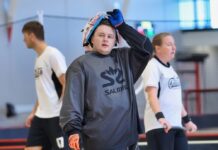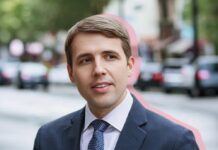His road to leadership has been a bumpy one, but a determined David Cunliffe got what he wanted.Can he put Labour back in power, and is it what he really wants? Oliver Hall meets face to face to find out.
“Where would you like to do the interview?” Simon Cunliffe, David’s Media Director and first cousin inquires. “His house?” I ask, in trepidation that the suggestion will immediately be shot down. “I was thinking of a ‘getting to know David angle’,” I say responding to the silence at the other end of the line. “I’ll ask,” he replies, confirming what I felt, that this was a long shot. Yet on returning to the office after interviewing John Key, I am greeted with the news that we are on, to interview and shoot David (photographically speaking) at Casa Cunliffe on Friday 15 August. Squeals of excitement are induced.
On Friday morning myself, our photographer Patric and my assistant Tux, descend on their Herne Bay residence. We are a woman down, as our make-up artist has had car trouble. His wife Karen greets us (David and team have been delayed) and is utterly delightful; warm, bright, I can’t help but think how quickly she would get my vote. She volunteers for make-up duty herself. I ask her how it feels to be involved in the election run-up. “We knew it would get nasty, but didn’t realize how nasty,” she says candidly. My heart sinks. She confesses missing him as he spends days away on the campaign trail and worrying about how little sleep he gets (less than five hours a night). It reminds me of the infamous comment he made to The Listener in 2008, denying he would ever want to be Prime Minister: “it’s a bastard job and I have a young family,” he had told them. Obviously in the six years since, he has changed his mind. I feel less sure she has.
After he has arrived and we have settled on his patio, I ask Cunliffe if his own party really want him to be PM. “I have worked hard and our team has reciprocated to ensure we have a unified caucus and unified party going forward,” he says assuring me he has their full support. He denies that an Anyone But Cunliffe contingent still exists. “It’s been renamed All Behind Cunliffe,” he deadpans, before assuring me he respects Phil Goff and David Shearer, “enormously.”
So why is National polling better? “It goes into this election with several historical advantages. Including a PM who has been around a lot longer then I have and has enjoyed the benefits of incumbency. With Nicky Hager’s book out that mask is rapidly coming off.” He tells me.
Hager’s Dirty Politics was released two days before our interview and has caused quite the stir. Cunliffe feels the book is helping to ensure that, “people understand behind [John Key’s] smile there is an apparatus of dirty tricks including some of the most abusive and personal tactics ever seen in NZ politics.” He tells me that Labour are within a few percent of being able to form a coalition government and, “victory is within our grasp.”
He believes that it is not just LGBT issues that should encourage our community to vote Labour. “The gap between the rich and the poor is getting wider and wider, so if gay people know what it’s like to experience discrimination and disadvantage – how about the fact that 10% of New Zealanders own more that the other 90%? A quarter of our kids are growing up under the poverty line, that’s wrong and it’s also not smart. How are you going to have a productive, highly educated workforce?” He questions.
“There’s always the risk that when another generation come along who haven’t had to fight for it that they take it for granted,” Cunliffe admits when I ask about younger people voting in an age where marriage equality is established. However highlighting the strength of his team’s rainbow caucus and Labour’s consistent support on LGBT issues, he says he feels confident, “the gay vote will come home for Labour.”
Cunliffe tells me, “by world standards,” he believes New Zealand is a good place for young LGBTs to grow up, but could still be improved. “We still have: incidents of bullying, discrimination in the workplace, some areas of our culture where for religious reasons or others – there is persistent stereotyping of LGBT people. And we aren’t yet at the ideal where everybody is accepted and respected for who they are.” He is quick to point out that he himself is a religious man, choosing St Matthew in The City as his church of choice. It is one of the country’s most progressive churches; on Sunday nights housing a dedicated rainbow community service. Just like his church Cunliffe believes we as a nation need to build, “a culture that consistently celebrates diversity and respects human rights.”
I ask him if he believes this attitude should stretch beyond our own culture and see our leader advocating gay rights to our commonwealth cohorts and pacific neighbours. Like John Key, he says he is shocked that homosexuality is still punishable in 42 Commonwealth countries. “Those are not good numbers… Of course being gay shouldn’t be a crime. If we have bilateral contact with commonwealth countries who are actively discriminating against gays, I could certainly see us raising that as a human rights concern in bilateral discussion.”
Labour’s LGBT caucus, Rainbow Labour, highlights a striking contrast between our two major parties. Currently National’s only out MP is Chris Finlayson, who declined to be interviewed by express and voted against marriage equality. Cunliffe believes Rainbow Labour brings, “an awareness of disadvantage and discrimination which fires them with an even greater passion to overcome that for others.” He says out MPs like Grant Robson and Maryan Street are, “top flight heavy hitting MPs… amongst the best of their generation,” but saves his highest praise for Louisa Wall.
“Louisa is a phenomenon: a double national sports representative, a very bright person, who is also very strong in herself.” He contemplates whether Wall’s orientation, “has contributed to that sense of strength, because she has had to be very clear about who she is, knowing that it’s not always going to be easy.”
Sounds like she will make a great Prime Minister one day
Article | Oliver Hall. Photos | Patric Seng.























